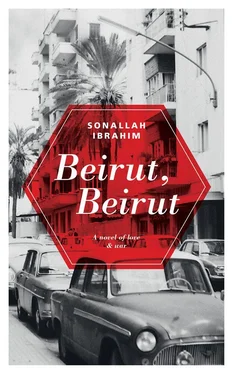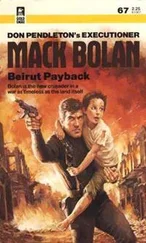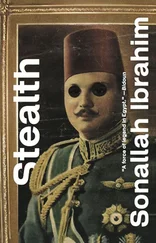“If she is using me to thwart the relationship the two of you have, then what makes you think she won’t do it again with someone else?”
“Leave that to me to worry about,” she said. “What I want from you is for you to end your relationship with her as soon as you leave. No promises of any kind.”
“I haven’t conceded that there is anything between us. In any case, I’m not the kind of person who loves writing letters.”
“I knew I could rely on you.”
As she stood up, she stared at me with a revealing look, as though making certain I would do what she had asked. She shook hands with me to say goodbye, and then walked away.
I watched her go, confidently standing tall and erect as she walked between the tables. Then I paid the bill and left.
I found Wadia busy preparing a tray of potatoes in the oven, so I got down to work on the revised copy of the voiceover until I was done with it. Then I called Antoinette and offered to bring it to her after lunch.
“I have two spare tickets to an Arab concert,” she said. “How would you and Wadia like to come? You could bring the voiceover and I would bring the check for your payment.”
I called out to Wadia and told him what Antoinette had suggested. He agreed to go.
“We’ll do it,” I told her. “Only, would it be possible to be paid in cash, rather than by check? I won’t have time to cash it tomorrow.”
“I’ll try,” she replied.
The concert began at seven. That gave me enough time to eat and review the voiceover one last time. At six forty-five, Wadia and I took a taxi to the American University in Beirut.
There was a large crowd in front of the concert hall and Antoinette was hard to find. She was wearing a light fake-fur coat over the usual pair of jeans and slender high-heel shoes.
She squeezed my hand warmly, and I kissed her on the cheek. We went up to the entrance, but a policeman came over to us and pointed to her purse. She opened it and pulled out a gun that she offered to him. The policeman put it in a side storage area, after giving her a receipt. A young man next to me pulled out his gun, getting ready to hand it over. Wadia and I walked through after declaring we had no weapons.
We had a hard time finding a place to sit. I noticed the tense atmosphere that dominated the hall, as well as the excitement of the audience.
“It’s the first time that people are out at night in Beirut since the killing of Bashir Ubayd,” Wadia observed.
I handed the voiceover to Antoinette. She gave it a quick glance and put it in her bag. She handed me an envelope that contained my fee.
“If you want to make any adjustment in the text,” I said, “or if there turns out to be any problem with it, write to me.”
She nodded in agreement. I turned my attention to the printed program that Wadia handed me. The concert was made up of songs by Sayed Darwish , and some of Leila Mourad’s songs composed by Daoud Hosni, as well as some Umm Kulthoum numbers composed by Zakariyya Ahmad, in addition to the poem “They taught him how to be hard”, by Abd al-Wahhab.
I leaned over Antoinette and whispered to Wadia, “Did you notice that the selections in the program are all Egyptian?”
Finally, the curtain raised on a Lebanese ensemble, with the musicians sitting in a row in the front, and the male and female choristers behind them. The concert began with a well-known song by Sayed Darwish made famous by Fairuz, “Visit Me Once Each Year”, followed by two of his songs about various professions — “The Cart Drivers” and “The Pickpockets”.
It was an excellent performance and the applause was thunderous. I was swept away by a feeling of elation. When the ensemble sang “That’s What Happened”, the pent-up dam burst.
Written more than sixty years ago, the song, with lyrics by Badia Khairi, went:
What happened, happened, so don’t blame me:
You don’t have the right, for we are not free.
How can you say I’m to blame, my brother,
When the wealth of our land belongs to another?
Talk to me first about the things we need,
Then you can blame me for my misdeeds.
Instead of them gloating over our plight,
With your hand in mine, we’ll stand and fight.
We are one people,
Our hands are strong.
Tears flowed from my eyes like a flood. I couldn’t stop them. I sobbed without restraint. I sensed that Wadia and Antoinette were exchanging glances.
“What’s the matter?” Antoinette whispered in my ear.
I didn’t answer her, but abandoned myself to weeping.
A little later, it was intermission, and I dried my tears. We went out to the garden of the American University to smoke. Wadia reminded me of our student days, and the tears started up again, pouring from my eyes in spite of myself.
He put his arm around me, and began patting my shoulder. Soon a sense of calm came over me, and I dried my tears. I was able to keep control of myself for the rest of the concert.
The audience clapped for a long time when the program ended. The ensemble played an encore of some of its songs, and then we finally left our seats and moved slowly to the door. Everyone was dragging their feet, as though they hated to go back to their homes.
Antoinette reclaimed her gun and we left the concert hall. We had barely stepped out onto the street when we heard the sound of gunfire nearby.
Shouts went up from different places; some people ran, while others brandished their guns.
“Run,” shouted Wadia.
Antoinette took off her shoes and clutched them in her hand along with her purse. She carried the gun in her other hand. We set off running, while she led us through streets that took us away from the neighborhood.
We heard no more gunshots, so we slowed down, and finally stopped, out of breath. We heard the sound of a speeding car coming up behind us, so we pinned ourselves against the wall for protection. A military jeep, enclosed on all sides, sped past us. We followed its blinding headlights as they danced on the walls of buildings and fell on an old poster that had the famous photo of Gamal Abdel Nasser where he seems to be sad and dejected, immediately following the 1967 defeat.
Wadia offered to let Antoinette stay the night with us, but she refused and insisted on going back to her house in East Beirut. So we put her in a taxi and we took another to the apartment.
My last day in Beirut began with overcast, cloudy weather. Wadia was still sleeping, so I had my breakfast while reading the papers, which carried news of a new Israeli attack on South Lebanon. There were several photos of houses destroyed as a result of this attack, and of the victims lying in hospital beds.
I got my suitcase ready, cleaned the room and made the bed. I did the same thing in the kitchen and living room. Finally, I took a bath and put on my clothes. In the meantime, Wadia woke up and had his breakfast. When I went back to the living room, I found him getting ready to go out.
“I’ll be back before tonight to go with you to the airport,” he said.
“You don’t have to do that,” I responded. “I can order a taxi.”
“I’ll order it for you. Is six o’clock all right?”
“That’s fine.”
He headed to the door, but I stopped him, saying, “If you’re coming back early, call me first. I might have a female visitor.”
He promised he would, and left the house.
There was a bottle of whiskey on the desk, so I poured a glass and sat down to drink it. A little before noon, the phone rang.
Picking up the receiver, I said “hello” in a flat, mechanical tone.
Lamia’s scolding voice reached me: “You’re in a bad mood.”
Читать дальше












